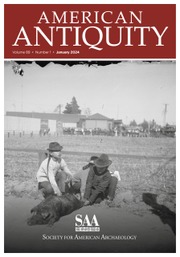Statement from the Editorial Board on Inclusion, Diversity, Equity, and Accessibility
The American Antiquity Editorial Board crafted this statement as a guide for the mission and future of the journal. It encompasses a set of practices to ensure that individuals from a broad range of backgrounds are represented in the journal. This statement also encourages and supports the work of archaeologists who might not normally see American Antiquity as their journal of choice. In full, the statement reads:
American Antiquity aims to publish high-quality rigorous research by a broad range of authors working in or on topics related to North America. Within the pages of American Antiquity, there are disparities in the representation of BIPOC, early career scholars, and scholars representing different nationalities. In soliciting and publishing academic works, the journal is committed to addressing these disparities by welcoming and amplifying voices that have been traditionally marginalized, excluded, or discounted in the field. Therefore, we encourage submissions from those who are underrepresented due to race, ethnicity, gender identity, disability, or other protected characteristics within the academy, cultural resource management, or state and federal agencies. In an effort to create systemic and meaningful change within the discipline of archaeology, American Antiquity welcomes papers on racism and other forms of inequality in the past and present or that seek to transform the practice of archaeology, including through collaborative and engaged research with and by descendant communities. The board also encourages submissions that engage with critical theories, including but not limited to antiracism, anticolonialism, and decolonizing, Indigenizing, and feminist perspectives. American Antiquity also seeks to broaden and diversify its publications by encouraging authors to submit coauthored manuscripts and to adopt more inclusive citational practices and language. Inclusive language is unbiased and respectful of all peoples, and the expectation is that authors will avoid sexist pronouns and eschew derogatory terms and stereotypes. Finally, American Antiquity is committed to incorporating Diversity, Inclusion, and Equity principles into the structure of the journal by recruiting peer reviewers from a broader range of fields and perspectives and by maintaining a diverse editorial board. To this end, the editor has appointed an Editorial Board (https://www.cambridge.org/core/journals/american-antiquity/information/about-this-journal/editorial-board) of archaeologists who represent a range of genders, backgrounds, research interests, graduate training, and lived experiences, and submissions are recruited and vetted from a broad and diverse pool.
The board also revised the description of American Antiquity for the home page of the website: “American Antiquity (AAQ) is a peer-reviewed, quarterly journal and is considered the premier journal of North American archaeology. AAQ is devoted to archaeology regionally conducted in the Western Hemisphere (North America) inclusive of diverse archaeological methods and theory pertinent to the study of North American archaeology and closely related subjects with global impact.”


